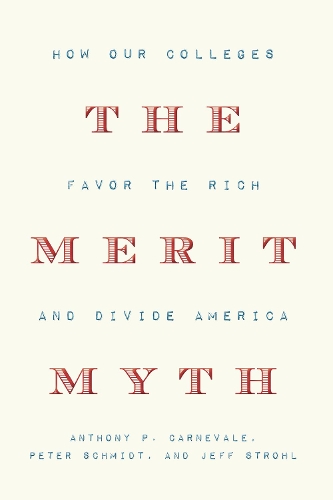
The Merit Myth: How Our Colleges Favor the Rich and Divide America
(Hardback)
Publishing Details
The Merit Myth: How Our Colleges Favor the Rich and Divide America
By (Author) Anthony P. Carnevale
The New Press
The New Press
4th August 2020
United Kingdom
Classifications
General
Non Fiction
378.19826942
Physical Properties
Hardback
256
Width 139mm, Height 215mm
Description
Colleges fiercely defend America's deeply stratified higher education system, arguing that the most exclusive schools reward the brightest kids who have worked hard to get there. But it doesn't actually work this way. As the recent college-admissions bribery scandal demonstrates, social inequalities and colleges' pursuit of wealth and prestige stack the deck in favour of the children of privilege. For education scholar and critic Anthony P. Carnevale, it's clear that colleges are not the places of aspiration and equal opportunity they claim to be.
Reviews
Praise for The Merit Myth:
"Those interested in inequities in the admissions practices of elite colleges will find this a considered examination."
Library Journal
"A strong argument for educational reform at every level in order to make schooling truly equitable."
Kirkus Reviews
"The Merit Myth . . . meticulously detail[s] the many ways U.S. colleges favor the rich."
The Hechinger Report
The Merit Myth offers compelling policy proposals to address an increasingly fractured society, including a tax on wealthy colleges endowments, the end of legacy admissions and for all Americans to complete a minimum of two years of college.
Times Literary Supplement
"Rooted in history, packed with detail, The Merit Myth exposes with passion and precision the deep structural inequities that stain American higher education today. A powerful and convincing case that we can and must do better."
Paul Tough, author of The Years That Matter Most: How College Makes or Breaks Us
"Does college matter Carnevale, Schmidt and Strohl answer the question definitivelyhell yes!with unassailable data, compelling stories, and smart reasoning. The Merit Myth shows that in an era where fairness and economic justice are being thwarted, the best path to upward mobility is through high-quality postsecondary learning."
Jamie Merisotis, president and CEO, Lumina Foundation
"A powerful wake-up call to the widening gap between America's educational haves and have-nots, and [a counter to] the laissez-faire presumption that business-as-usual will fulfill higher education's responsibilities as the prime lever to social mobility in a knowledge economy."
Nancy Cantor, chancellor, Rutgers University-Newark
Author Bio
Anthony P. Carnevale, a chairman under President Clinton of the National Commission on Employment Policy, is the director of the Georgetown University Center on Education and the Workforce. He lives in Washington, DC.
Peter Schmidt, the author of Color and Money, is an award-winning writer and editor who has worked for Education Week and the Chronicle of Higher Education. He lives in Washington, DC.
Jeff Strohl is the director of research at the Georgetown University Center on Education and the Workforce. He lives in Washington, DC.
